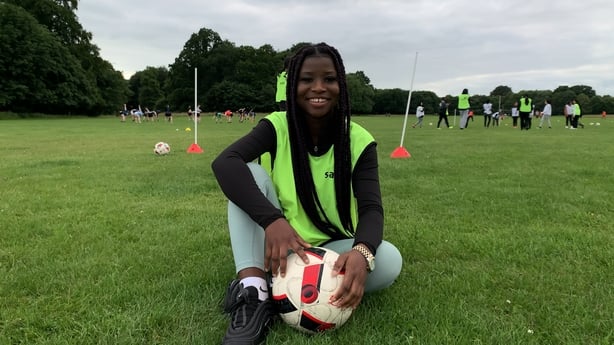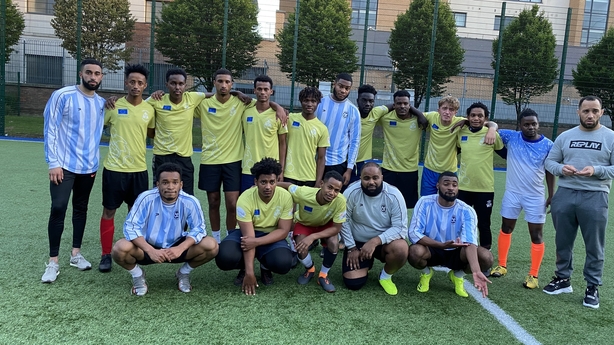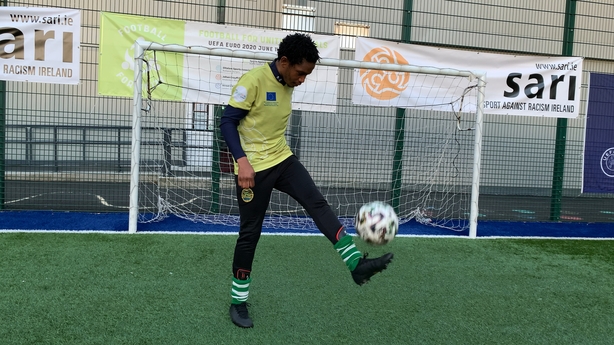As the final whistle is about to be blown on a festival promoting social inclusion through football, young migrants have told of the everyday racism they have endured in Ireland.
The month-long Football for Unity festival has been taking place at venues across the north-east inner city Dublin since 14 June.
Organisers Sports Against Racism Ireland (SARI) have been using the games to explore heritage and to help new arrivals feel at home in Ireland.
Dublin is one of seven European cities hosting the festival to show how football can bring communities together.
Today's men's final is between Renford Rejects and SARI 2, while Diverse City will play against Le Pensionate in the women's category.
Former asylum seeker, Mariama Kamara, who plays for Diverse City, is one of the stars of the tournament. In 2015, at the age of just 15, she fled Sierra Leone leaving her family behind to start a new life in Ireland. She described her first days in Ireland as "crazy and mental".
She said: '’All I did was cry all day long. I miss my family especially my dad. It was stupidly crazy. I never thought I could survive, but after playing football I got used to it and it helped me fight loneliness.’’
The 18-year-old said she still struggles to be accepted in the Irish society but since joining the SARI girls football team in 2019 she now has a sense of belonging.
She said: "When I first came here, it was hard going to school. I found it very difficult to make friends. I couldn’t speak English. At that time I was shy. I was afraid that if I spoke English they would say something and start thinking ’she doesn’t want to talk’.
"I got a lot of racist comments and criticisms. It was hard for me until I started playing football. That’s when I started getting along and started getting confidence in myself."

The sixth year graduate said she felt vulnerable and helpless when she arrived in Ireland and was forced to stop school for a week after being subjected to racial abuse and mocked by schoolmates.
But she says she has benefited from the tournament efforts to improve integration..
She said: '’The competition has helped me a lot. I met people from different countries. I have interacted with them, gotten to know their cultures and made more friends.’’
The games have so far attracted participants from more than 30 nationalities, including people in Direct Provision who made three of the 28 teams that registered for the competition across different age groups.
CEO of Sports Against Racism Ireland, Perry Ogden, said: "We have people from Eritrea, Pakistan, Albania, Democratic Republic of Congo, Kenya and South Africa. The idea is to reach out to people who might not normally get the opportunity to play football.
"Everybody involved has amazing stories. There’s a great bond especially with the SARI players. There’s a great community that is being formed around that."

Another player who has enjoyed participating in the tournament is Wedson Thindwa from Malawi. Wedson moved to Ireland in 2015 for college and said that football played a huge part in helping him settle here.
He said he struggled to make friends until he joined the SARI football team. And he is also pleased for the opportunity to play football again after finding it hard to join a team.

Wedson, 24, said that coming to Ireland had been a good adventure but hoped to see a more inclusive Ireland.
He recalled being racially abused by a stranger on a public bus. ''I was about to seat on the bus and some guy said you don’t deserve to be on this bus. Go back to your country. I didn’t do anything.’’ he said.
Wedson said sports is now helping him overcome some of the racist abuse he has suffered as a migrant. "You forget about everything, you just meet people and play football and you enjoy it," he said.
The Football for Unity tournament is also a celebration of the 60th anniversary of the UEFA European Football Championship, which ended last weekend.
Speaking about the racism directed at England players at the Euros, Perry Ogden said it was appalling and unacceptable. He said racism will not go away overnight and will take more than a generation to defeat, but education would play a big part.
He said: "We have to go back, we have to unpick, we have to educate young people and we must do that urgently because people have to know, they have to understand the history of how it (racism) started."
Perry said that since the competition kicked off there was evidence that more people are already beginning to embrace diversity.
He said: "One of the exciting things about the tournament is to come to the North Inner city, one of the most disadvantaged areas in Ireland, which also has one the highest minority population in the country.
"The white Irish and the ethnic minorities don’t always mix in this part of town. Now I’ve been talking to people who are from the street and they’ve got great excitement on their faces saying ‘it’s a fantastic game’ and asking when the tournament going to start again.’’






